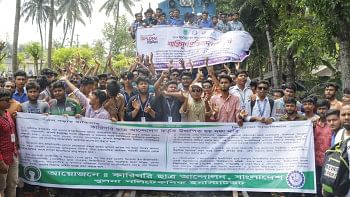Focus more on renewable energy: analysts
Bangladesh should leverage its vast renewable energy potential, including solar power, to deal with its energy crisis, experts said yesterday.
The observations came at a seminar, "The Untapped Mine: How can we fight climate change, revitalise the economy and gain energy independence for Bangladesh" organised by Bangladesh Poribesh Andolon, an environmental body, in the capital.
Around 53 percent of Bangladesh's population have access to grid electricity, with the rest depending on the costly kerosene and solar power.
The total solar energy absorbed by earth's atmosphere, oceans and land masses in one hour is more than the world's demand for energy a year, said Sajed Kamal, adjunct lecturer of Sustainable International Development Programme at USA's Brandeis University, while presenting the keynote paper.
"But it is untapped. We are mostly using the solar energy in a natural way," said Kamal, also the author of The Renewable Revolution, adding that Bangladesh's exposure to high solar radiation presents great opportunities.
Prof Dr Saiful Huque, coordinator of Dhaka University's Renewable Energy Research Centre, said Bangladesh's attitude towards solar energy is that of an afterthought.
“People who control the fossil fuel are also in charge of solar energy, and they do not take the matter of renewable energy seriously. The government should form a dedicated body for it," he said.
Huque, also the secretary of Bangladesh Solar Energy Society, said the country's energy demand is actually growing annually at 14 percent, and not as per government's estimation of 7 percent.
"The renewable energy can bridge this gap," he said, adding that Bangladesh would have to develop local infrastructure and not rely on costly imports to effectively harness the solar energy.
Huque also criticised the government for not ensuring proper installations of solar panels on rooftops.
"People responsible for monitoring are not doing their jobs properly. As a result, new buildings have mushroomed with low-quality products."
The professor said poli-cymakers should think in terms of kilowatts rather than megawatts when conceiving energy for rural areas.
“A solar panel with a capacity of about three kilowatt is sufficient to light two bulbs and charge a mobile phone, facilitating electricity provision to the masses.”
Huque also urged the government to lower import duties on solar energy products.
"Unfortunately, the import duties are higher for energy-efficient products."
Anu Muhammad, a profe- ssor of economics at the Jahangirnagar University, said the government talks on solar energy seem insincere: "There is an organised plan to downplay its significance and potential."
He said the renewable energy has not been given much weight by the government, despite it, and not fossil fuel, being the future source of energy.
"But we will not get an optimum solution if the actions are governed by profit maximisation.”
Muhammad, also a leader of the National Committee to Protect Oil, Gas, Mineral Resources, Power, and Ports, said coal-based power plants, taking into account the social and environmental costs, come out to be costlier than renewable energy solutions.
"We should have clear objectives for developing the technology. If we treat it like a project we will not progress far. And in future a day might come when we will have to buy sunlight from others," he said.
Khursheed-Ul-Islam, senior adviser on Sustainable Energy for Development for GTZ, said the solar energy is an untapped mine for Bangladesh.
"But it has to be made affordable for people," he said, adding that Bangladesh has already made a good impression with its installations of over 1.5 million solar home systems in off-grid areas.
"Although we have not had much success yet in generating wind energy, increasing the tower height can improve our chances," Islam said.
He also suggested exports of the biogas emitted from Bangladesh's over 1 lakh poultry farms.
BAPA President M Shahjahan chaired the seminar, and Md Habibur Rahman, associate professor of Department of Applied Physics, Electronics and Communication Engineering, at the University of Dhaka, also spoke on the occasion.

 For all latest news, follow The Daily Star's Google News channel.
For all latest news, follow The Daily Star's Google News channel. 



Comments